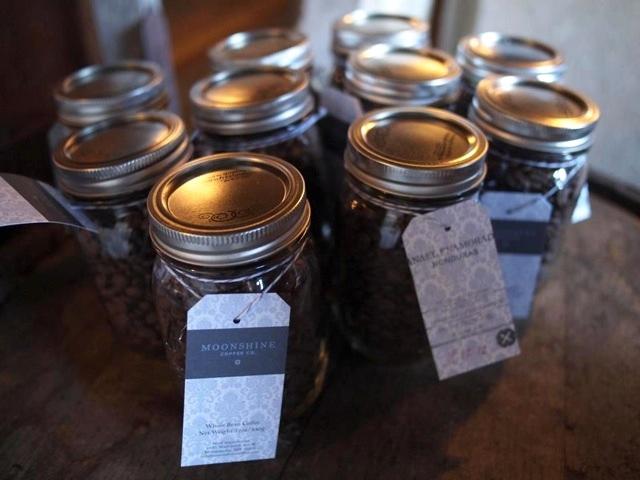This is the fourth post in a new SGT series that looks at CSA -- community supported agriculture -- from the farmer's perspective. Also check out earlier posts: Adventures in Farming, Managing Expectations, and Crop Planning.
In the organic and sustainable farming world, it feels like there's no such thing as a trade secret. Unlike most other industries, where strategy and product development are held in reserve from competitors, in our world, it's share and share alike.
If we want to learn about the best cucumbers to grow for drought conditions, or the most efficient way to place irrigation lines in the field, or the richest organic compost that fits within our budget, all we have to do is ask around. Having come from the corporate arena, where I did a spin through a top-tier consulting firm, this type of information sharing has been not just hugely helpful, but also a bit shocking.
Although we theoretically compete for the same customers for our CSA enrollment or spots at the farmers’ market, in the local sustainable farm scene, there's a feeling that we farmers are part of a larger movement toward real food, that we're essential for providing some fix to our broken food system, and that to do that, we need to work together.
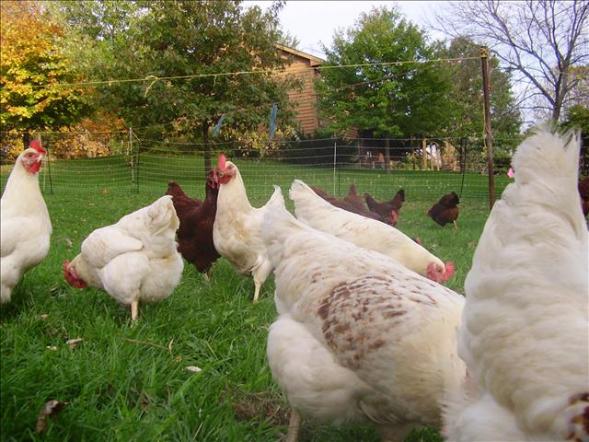 Happy chickens at Sunshine Harvest Farm, source of eggs for our CSA members
Happy chickens at Sunshine Harvest Farm, source of eggs for our CSA members
As a result of those relationships, we've developed a number of "add-on partners," who provide valuable options for our CSA during the season. For a CSA, an add-on is any product that comes from another purveyor; those products can be added to the regular box of vegetables during the same delivery.
We work with the partners to determine a good price for members, and then take advance orders so that most add-on products will be in place before the season starts. Because we coordinate all the distribution, members appreciate opening their box and getting a profusion of vegetables, as well as eggs, honey, or even coffee, based on what they've ordered in the spring. For example, one member might add on a one-pound bag of granola monthly, while another adds weekly egg delivery and a mushroom mix twice per month.
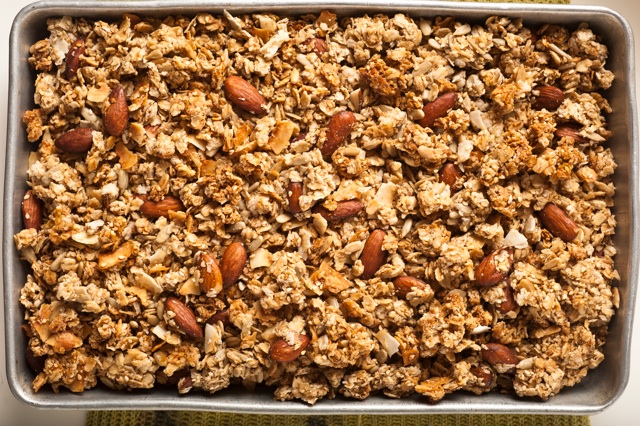 Birchwood Cafe's granola is likely to become a popular add-on (Photo: Mette Nielsen)
Birchwood Cafe's granola is likely to become a popular add-on (Photo: Mette Nielsen)
This year, our add-on partnerships will bring honey from Beez Kneez Bicycle Delivered Honey, mushrooms from Cherry Tree House Mushrooms, coffee from local roasters Moonshine Coffee Company (pictured at top), eggs from Sunshine Harvest Farm, granola from Birchwood Cafe, and a children's education program from Budding Farmers. We feel that this selection represents a nice range of products that highlight the local food scene, without turning us into grocery managers.
The partners deliver their products to us either at the farm or at our house in South Minneapolis, and we organize them and pack them during our CSA delivery day. That means we can't make every box the same, as some CSAs do, but instead have to label each box with a member name. When it comes to keeping all the orders straight, Karla is a genius with a spreadsheet, fortunately. There are already hundreds of moving parts to a CSA farm, and dozens of spreadsheets, so creating this additional layer of complexity isn't as daunting as it seems.
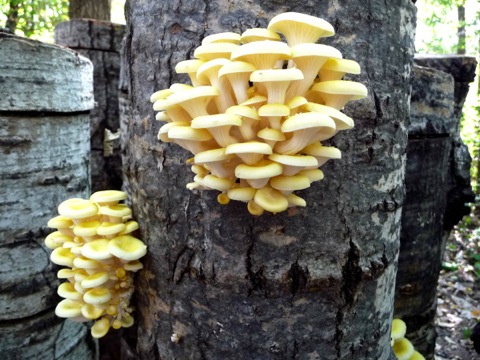 Gold oyster mushrooms at Cherry Tree House Mushrooms
Gold oyster mushrooms at Cherry Tree House Mushrooms
Building community
Finding our partners wasn't a difficult feat, and most of the relationships evolved as a result of participating in the very vibrant local farming scene. For example, last year we rented greenhouse space in St. Paul from Grow! Twin Cities, a nonprofit that works to provide resources for small farmers. Jeremy McAdams, owner of Cherry Tree House Mushrooms, was also on the same land.Since mushrooms are one of my favorite foods, I had plenty of questions for Jeremy about how to grow them, and he answered every question with the patience of a Zen master. Obviously passionate about mushrooms himself, he was happy to geek out with me, showing me how his inoculated logs were fruiting and how he arranged shade cloth so the logs would stay at an ideal temperature. So, when we were considering add-ons for the Bossy Acres CSA, it was only natural for us to ask Jeremy if he wanted to participate.
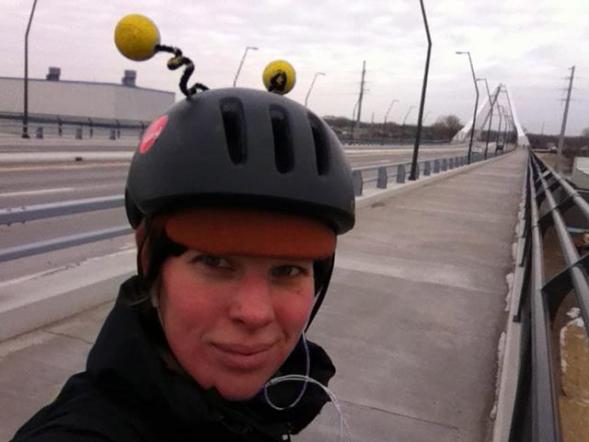 Kristy Allen at Beez Kneez Bicycle Delivered Honey in her around-town delivery outfitThat same community vibe
applies to our other partners as well, like Kristy Allen at Beez Kneez, who is
so dedicated to sustainable honey production that she dresses like a bee when
she delivers honey by bicycle around town. After getting addicted to her clover
honey last year, we began chatting with her about her business, and she ended
up putting hives on our farm, which she'll also do this year. That means that
our CSA members will get a little bit of Bossy Acres mixed in with their Beez
Kneez honey, as well as a taste of other organic farms. It's an apt analogy for
how everyone blends together in this community, making it all sweeter as a
result.
Kristy Allen at Beez Kneez Bicycle Delivered Honey in her around-town delivery outfitThat same community vibe
applies to our other partners as well, like Kristy Allen at Beez Kneez, who is
so dedicated to sustainable honey production that she dresses like a bee when
she delivers honey by bicycle around town. After getting addicted to her clover
honey last year, we began chatting with her about her business, and she ended
up putting hives on our farm, which she'll also do this year. That means that
our CSA members will get a little bit of Bossy Acres mixed in with their Beez
Kneez honey, as well as a taste of other organic farms. It's an apt analogy for
how everyone blends together in this community, making it all sweeter as a
result.
Unlike a CSA, where a member assumes a level of risk, add-ons are more like standard product orders. If one of our partners can't deliver, then the members would get a refund on what they've already paid. We've never had that happen, though, and hopefully, it will be a rare-or-never situation.
Bountiful box
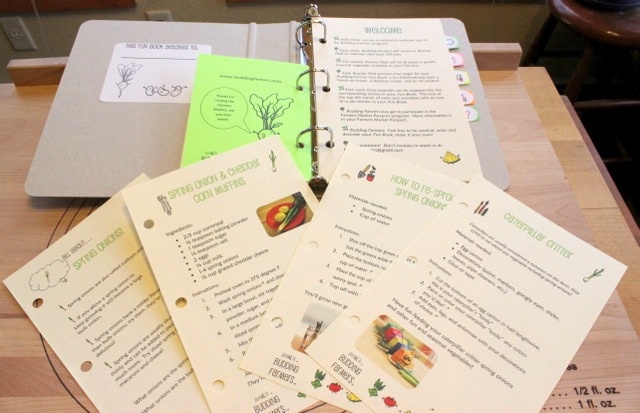 A sample of the enrichment packs for children from Budding FarmersNot every farm does add-on
partners like this, and add-ons can involve added layers of coordination to a
job that's already plenty complicated, especially for larger CSAs especially (see
my last post, Crop Planning, to get a glimpse of the complexity). But for us, the ability to
include members in this lively, rich community through featuring other farmers’
lovingly crafted goods feels important. For us, the add-ons are about more than
convenience, they’re about connection.
A sample of the enrichment packs for children from Budding FarmersNot every farm does add-on
partners like this, and add-ons can involve added layers of coordination to a
job that's already plenty complicated, especially for larger CSAs especially (see
my last post, Crop Planning, to get a glimpse of the complexity). But for us, the ability to
include members in this lively, rich community through featuring other farmers’
lovingly crafted goods feels important. For us, the add-ons are about more than
convenience, they’re about connection.
By establishing these partnerships and using the Bossy Acres CSA as a delivery system for these passionate purveyors, we get to support people who have the same philosophy as we do: that local, sustainable food matters. And to make sure we don't lose sustainable farming, we all have to work together.
In the next installment of Behind the CSA Box, I'll cover how we keep on top of communication with members during the season. Until then, enjoy the sunshine and stay bossy!
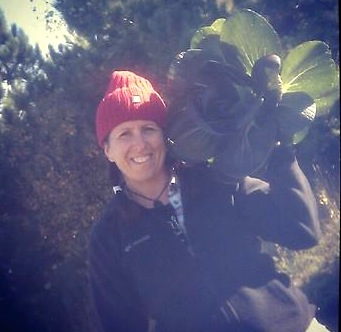
Elizabeth Millard owns Bossy Acres with her partner, Karla Pankow. They grow an array of delicious vegetables in Northfield, using sustainable and organic methods. Their CSA is sold out, but they'll be at the Mill City Farmers Market in May, and offering vegetables through Twin Cities Local Food during the season. Follow them on Facebook and on Twitter at @BossyAcres.

